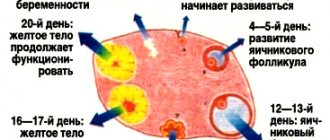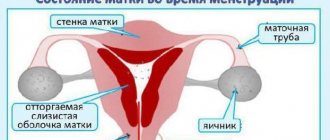Hate periods? Menstruation is a completely natural physiological process. Every girl, after reaching the threshold of fertility, is forced to put up with it every month. Unfortunately, this process is often associated with unpleasant health and some psychological problems. Statistics show that 70-80 percent of the fair sex suffer from the symptoms of premenstrual syndrome to one degree or another. Is it any wonder that psychologists hear complaints from many girls? The article describes the reasons for such hatred from a psychological point of view, and also gives advice on how to cope with PMS.
The menstrual cycle and accompanying changes
A regular menstrual cycle is an indicator of a woman's health. It is based on hormonal fluctuations that occur throughout childbearing age.
Normally, the cycle length is about 28 days; this figure may differ for all women. The first day of the next cycle is considered to be the day the menstrual flow appears.
Follicular phase
A drop in progesterone levels contributes to the shedding of the uterine lining. At this time, pituitary hormones, with the participation of the hypothalamus, stimulate the maturation of the egg. The level of estrogen in the body increases, which is responsible for the growth of the dominant follicle. After 3 days, menstrual flow stops, and by day 13-14, estrogen levels reach their maximum concentration. A woman may feel an increase in vaginal secretions and a slight tingling sensation in her side, which indicates her readiness to conceive.
The process of rupture of the dominant follicle and release of the egg is called ovulation. It lasts 1-2 days, and only during these days is successful conception possible. This process is facilitated by hormones produced by the pituitary gland. There are usually no symptoms during the natural process of ovulation. However, some girls feel slight discomfort in the pelvic organs and a strong sexual desire.
Luteal phase
After the release of the egg, the “behavior” of hormones is determined by the process of conception or its absence. The level of estrogen in the blood decreases sharply; in place of the follicle, or rather, from its shell, a gland is formed, which is called the corpus luteum. If pregnancy occurs, this gland, producing progesterone in large quantities, helps the embryo attach and nourish itself until its own placenta forms.
Without meeting the sperm, after 24-36 hours the egg dies and the corpus luteum begins to regress. The activity of the gland decreases and progesterone levels drop. Against the background of these processes, many women feel:
- arises;
- mood changes;
- fluid is retained in the body;
- Fatigue and malaise develops.
When progesterone drops to its minimum level, the uterus rejects the inner layer, which was intended to secure the embryo.
Do frequent mood swings need to be treated?
Bad mood caused by physiological changes in the female body does not need to be treated separately. But, if your periods are very difficult, you still need to see a doctor. With such changes, the gynecologist usually selects a comprehensive treatment and can prescribe drugs from the following groups:
- Hormonal agents to restore hormonal levels;
- Painkillers, in case of severe pain, especially in the first days of menstruation;
- Sedatives, in case of severe apathy and nervousness;
- Vitamins, magnesium and calcium, to restore normal metabolism in the blood and the functioning of the nervous system.
You can fight a bad mood at home. A soothing decoction of medicinal herbs: peppermint, chamomile flowers and rhizomes will help reduce irritability and aggression. This folk remedy has no side effects, so almost everyone can take it.
Support and understanding are very important for a woman during this period. Therefore, loved ones should pay maximum attention and not provoke strong emotions. In addition, it is important to understand that her words and actions during this period are influenced by hormones, so you should not be offended, but rather try to calm her down.
If neuroses and disorders become widespread and this causes danger, of course, you should consult a doctor. Perhaps the reason for this is not only menstruation, but also other mental processes.
How do you cope with PMS?
Naturally, everyone's reaction to the upcoming monthly cycle is different. It all depends on age, character, and even external circumstances. Therefore, to understand whether you are experiencing premenstrual syndrome, you can look at the symptoms you have. So, think about how deep the depressive state is, is tension clearly expressed? How often does sadness occur during this period, does your mood change, or does apathy appear? Do you get irritated at every occasion or get into conflicts? Also during this period, absent-mindedness appears, interest in what was recently attractive decreases. Notice whether your appetite changes, does the desire to overeat appear, or self-control is lost? Many people quickly get tired, drowsiness or, conversely, insomnia appears. If you regretfully answer “Yes” to all questions, then this is PMS and you will have to put up with irritability. You just need to help yourself live with it correctly. In particularly severe cases, women experience symptoms these days.
Ovulation
In our body it lasts only a day. This period is marked by the release of the egg from the ovary and its solemn procession into the uterine cavity. There she sits comfortably, waiting for her gentleman - the sperm. But this is physiology. This period is reflected in our well-being by only one parameter: increased libido. American researchers have long ago determined that the maximum number of adulteries falls on this significant day.
Since continuous pregnancy is not included in the plans of a modern woman, one way or another the next stage begins: from ovulation to the onset of menstruation. Not very cheerful - in the literal and figurative sense of the word. And the reason for this, as you understand, is also hormonal: the amount of estrogen decreases, and the amount of progesterone increases. This hormone is responsible for your midnight vigils in front of the refrigerator (increased appetite), and for muscle relaxation (decreased endurance), and for fluid retention in the body (slight swelling). Well, for the mood. It also leaves much to be desired. The peak of negativity occurs 2-5 days before the start of menstruation - the same notorious premenstrual syndrome. As you guessed correctly, the skin also feels the effect of this hormone. Her blood supply gradually increases, her sensitivity to the male hormonal spectrum increases, as well as to microbes. So the risk of development also increases in arithmetic progression. The statistics are inexorable: up to 70% of women note the appearance of pimples in the second half of the cycle.











